Walk Across Rome Part II: From Termini station home I pass 2,000 years of history with good food and wine as fuel
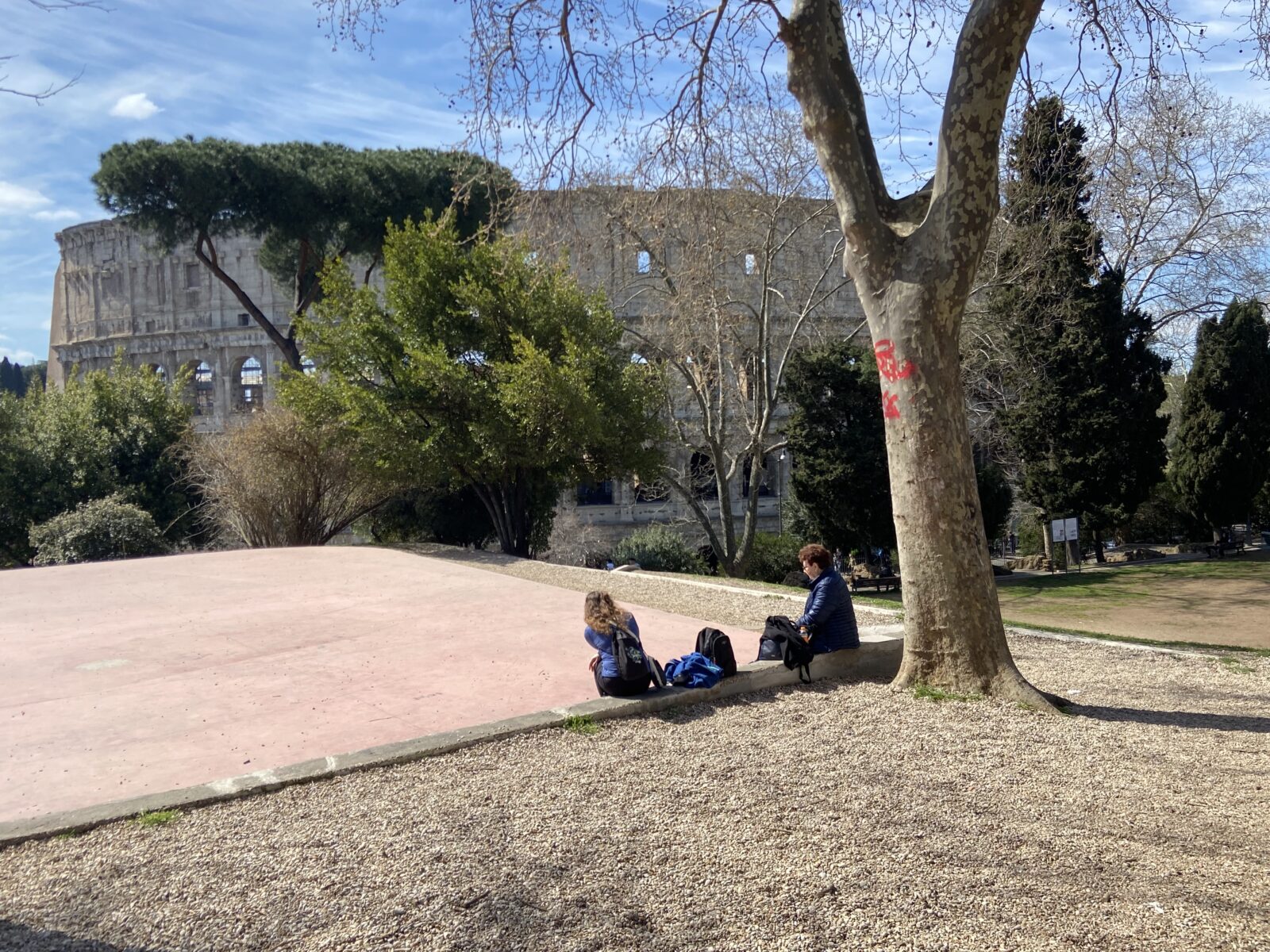
Like hungry birds flying south for the winter after freezing their feathers off for three years, tourists have returned to Rome. They came back in full force last year after Covid restrictions fell like the opening of prison gates.
In 2022, 5.8 million tourists visited Rome, a 500-percent increase over Covid-laced 2021. In the summer alone they pumped €17 billion into city coffers. This year, Rome’s tourist office expects a return to the pre-Covid levels of 10.3 million tourists.
It’s only March and it seems like all 10.3 million are visiting now.
Rome’s subway feels like New York’s A train at rush hour. The crowds around the Colosseum could fill the stands inside. I’m hearing more languages than a walk through the UN.
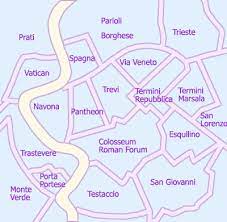
However, in Rome, I have one foolproof method to find solitude.
I take a hike. A long one. In the city. Alone.
In Italian, it’s called a passeggiata. In Rome, thanks to all the piazzas and maze of small roads, you can walk across town without ever going down a busy street. Four years ago I did it. I walked from the Termini train station on the east end of town to the Vatican on the west end. Zigzagging down narrow, cobblestone streets and alleys and dipping my head into interesting nooks and shops, I covered 7.5 miles in five hours without ever walking down a heavily trafficked road.
I can’t do that in Des Moines.
Saturday I did it again – almost. I took a different route. This time I walked from Termini to my home in the Monteverde neighborhood on the southwest part of town. I zigged and zagged and climbed for eight miles in 5 ½ hours. Except for three short stretches, I traversed the entire route on side streets and paths, through piazzas and parks.
Along the way I discovered a lush park with a great city view near my home, strolled under palm trees through a renovated piazza and had a lovely rigatoni dish on a quiet side street in normally noisy Trastevere. I also walked across 2,000 years of history.
Then again, not everything in Rome is lovely.
Take Termini. Please.
Rome’s Termini station
It’s not the train station. Renovated in 2000 for the Great Jubilee, it’s a sprawling, airy, well-organized transport hub with good shopping and an excellent food court. But the area across the street will never make Travel + Leisure magazine.
It’s a swarming mess of gritty coffee bars, grimy fast-food joints, ugly tour stands and dodgy discount stores. Throw in Rome’s few homeless sleeping outside the station and hundreds of tourists dragging roller bags on the narrow, cracked sidewalks and you have a city intro that “Roman Holiday” somehow skipped.
This was my starting point.
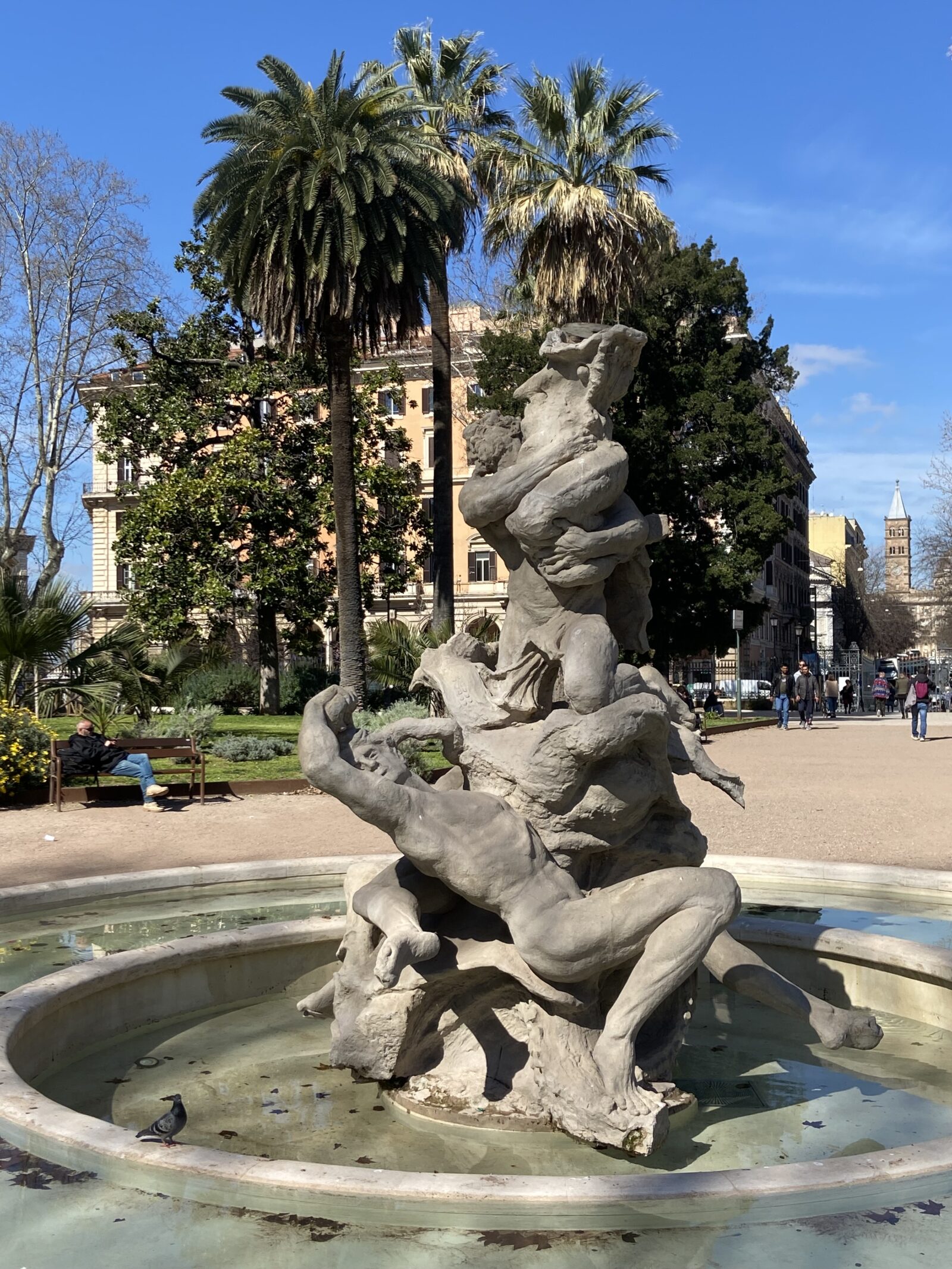
I began with a caffe schiumato, kind of a mini cappuccino, in a bar with no name. It was 10 a.m. and an African immigrant sipped something turquoise out of a martini glass. I opened my Citymapper app and Lonely Planet map and charted a rough course home on a gorgeous, sunny 60-degree day. March is to walking in Rome what January is to skiing in Cortina.
Termini’s Esquilino neighborhood has a boring grid system but plenty of side streets to escape the chaos. I walked down Via Rattazzi into the heart of the closest thing Rome has to a Chinatown. I passed many tiny clothes stores with barely enough items on sale to clothe a large family. I’d heard stories that some of these shops are fronts for illegal activity. That makes sense. In the 10 1/2 years I’ve lived here over two stints, I’ve never seen any of these stores have a single customer.
Piazza Vittoria Emanuele
I crossed Via Napoleon IV (crossing busy streets is allowed) through a bevy of cheap Indian-run electronics stores and in one block entered Piazza Vittorio Emanuele. I didn’t recognize it. I looked at my map. Maybe I took a wrong turn.
When I lived here the first time from 2001-03, my then-girlfriend lived down the street from the piazza. Built in 1870 and named for the first king of Italy, it was bigger than St. Peter’s Square. By the early 2000s it was scruffy with some tired palm trees and an overall tone of abandonment.
In 2020 it reopened after two years of renovation. On Saturday, I saw two Chinese boys and an Italian teen-ager shooting baskets at two hoops. Huge palm trees that look straight off a Hawaiian beach lined paved paths that meandered past big, gurgling fountains and yellow flower beds.
A group of college kids with daypacks were organizing a day trip somewhere. Three old men and a woman in identical black T-shirts practiced self-defense moves in a grass clearing. Still standing is the ancient ruin of Porta Magica (Magical Door), the gate to the entrance of Villa Palombara, once the residence of the famed Roman nobleman Massimiliano II Palombara.
I walked a few blocks down quiet residential Via Ferruccio and could only hear a screaming child from one of the tall apartment houses. I passed Vecchia Roma, an underground trattoria my ex and I frequented and where there’s still always a line at night.
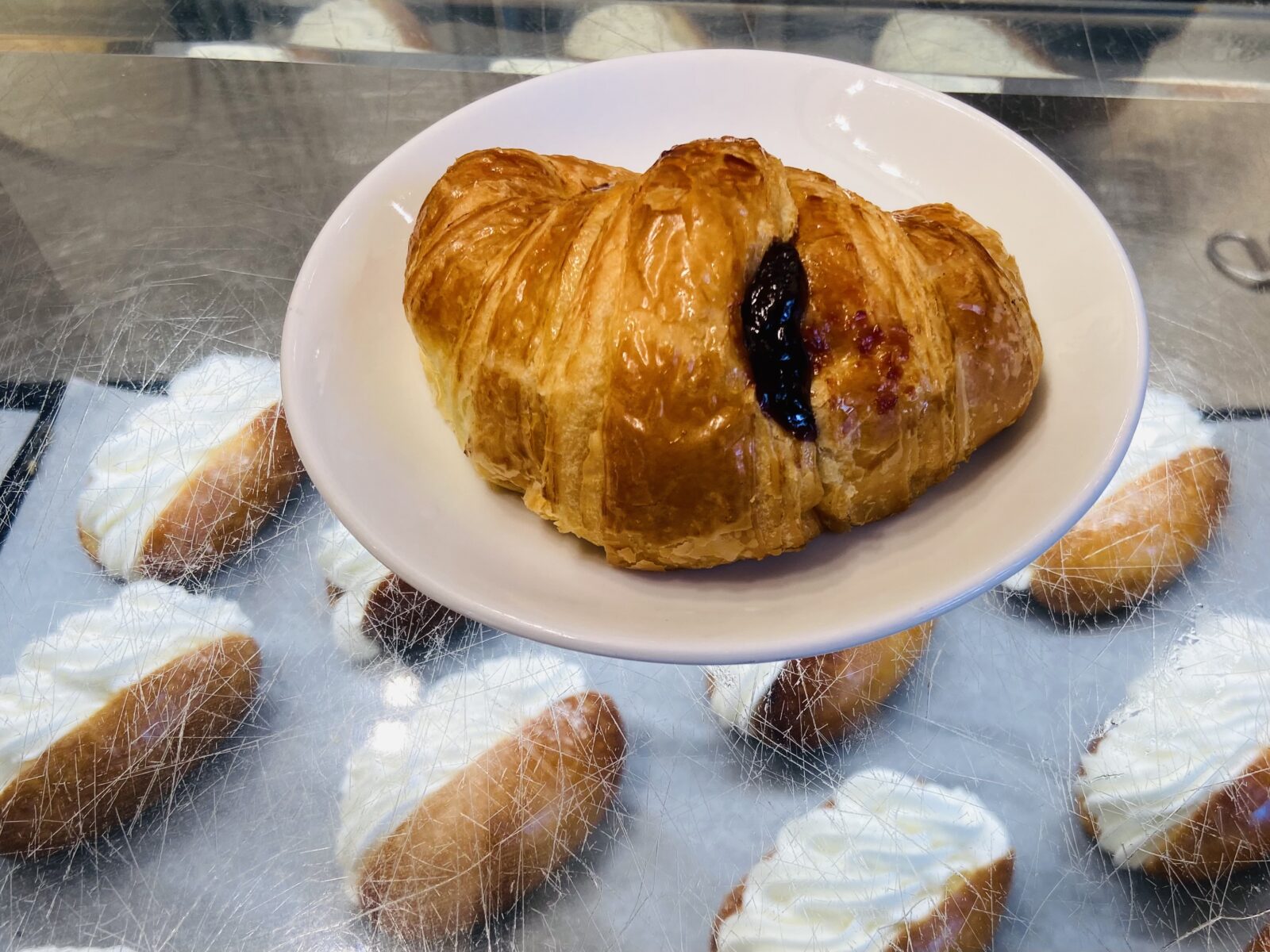
I stopped under her old apartment at Panella bakery. Panella started in 1929 and is on Via Merulana, one of the prettiest streets in Rome. Its cornettos are superb. I ordered a warm, soft cornetto di fragole (strawberry cornetto) for €1.50 and only slightly beat myself up when the cashier corrected the pronunciation of fragole I never get right. (It’s FRA-go-lay, not fra-GIO-lay).
I crossed Merulana and the bar where I tried my first cappuccino in 2001. The barista formed a heart with the foam. It was the first coffee I’ve ever liked. I saw it as an omen that I found a new home.
I was right. I’m still here, and I will be forever. This passeggiata is one reason.
Parco del Colle Oppio
I walked down Via Mercante into spotless Parco del Colle Oppio. From the Egyptian Embassy at the curiously unguarded entrance, I walked down the paved road lined with towering Mediterranean palm trees. People read and scrolled their cellphones on park benches.
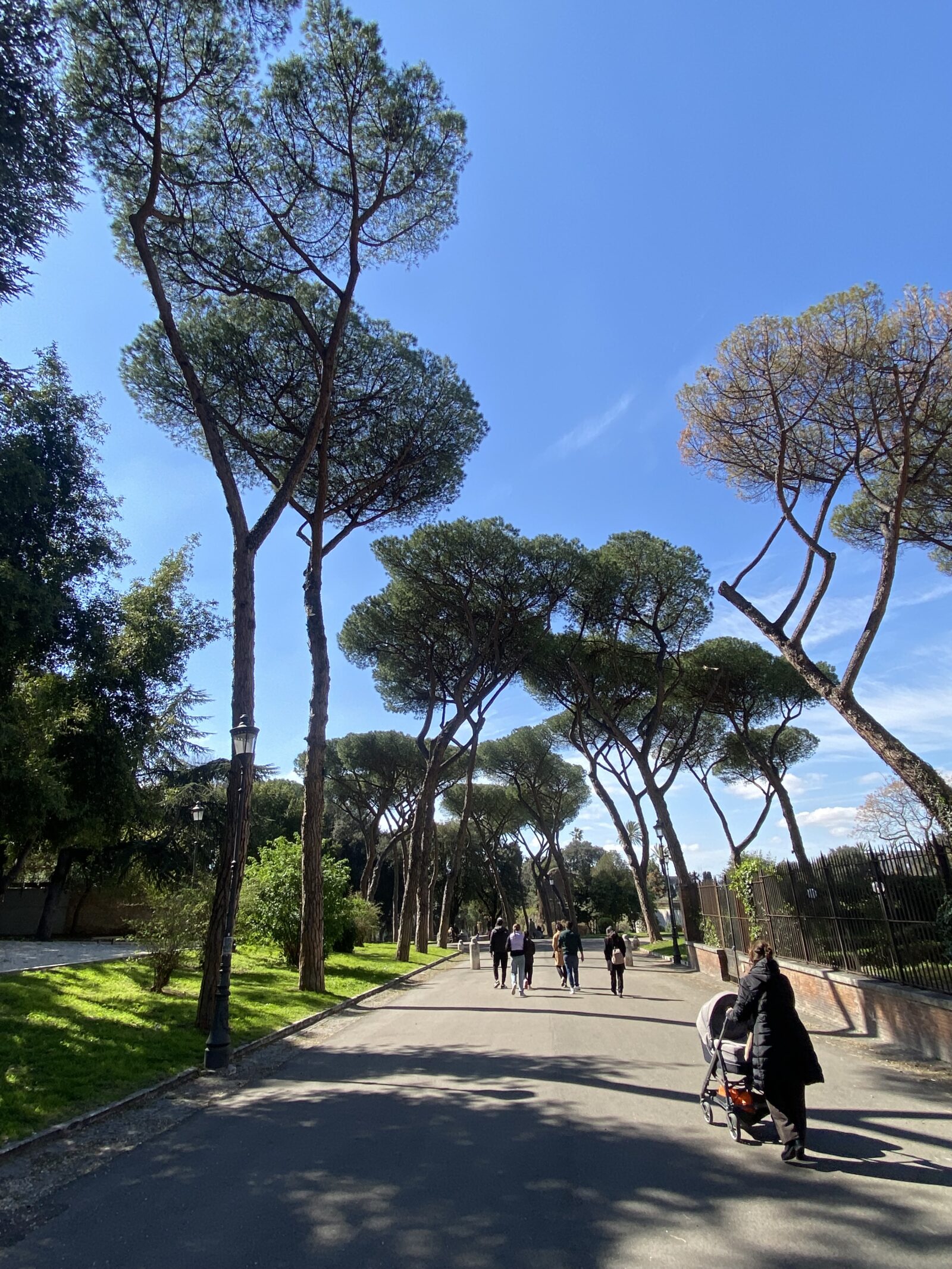
Behind the modern trappings were two brick walls, the remains of Trajan’s Bath. Built in 109 A.D., it once covered 60,000 square meters (646,000 square feet) and opened to the public, a necessity in an era when homes had no private bathrooms.
I turned right down Viale Serapide past the statue of Alfredo Oriani, a 19th century pre-fascist writer whose works about the return of Italian imperialism were banned by the Catholic Church. I wasn’t surprised to read that his posthumous works were edited by another fascist who followed.
Benito Mussolini.
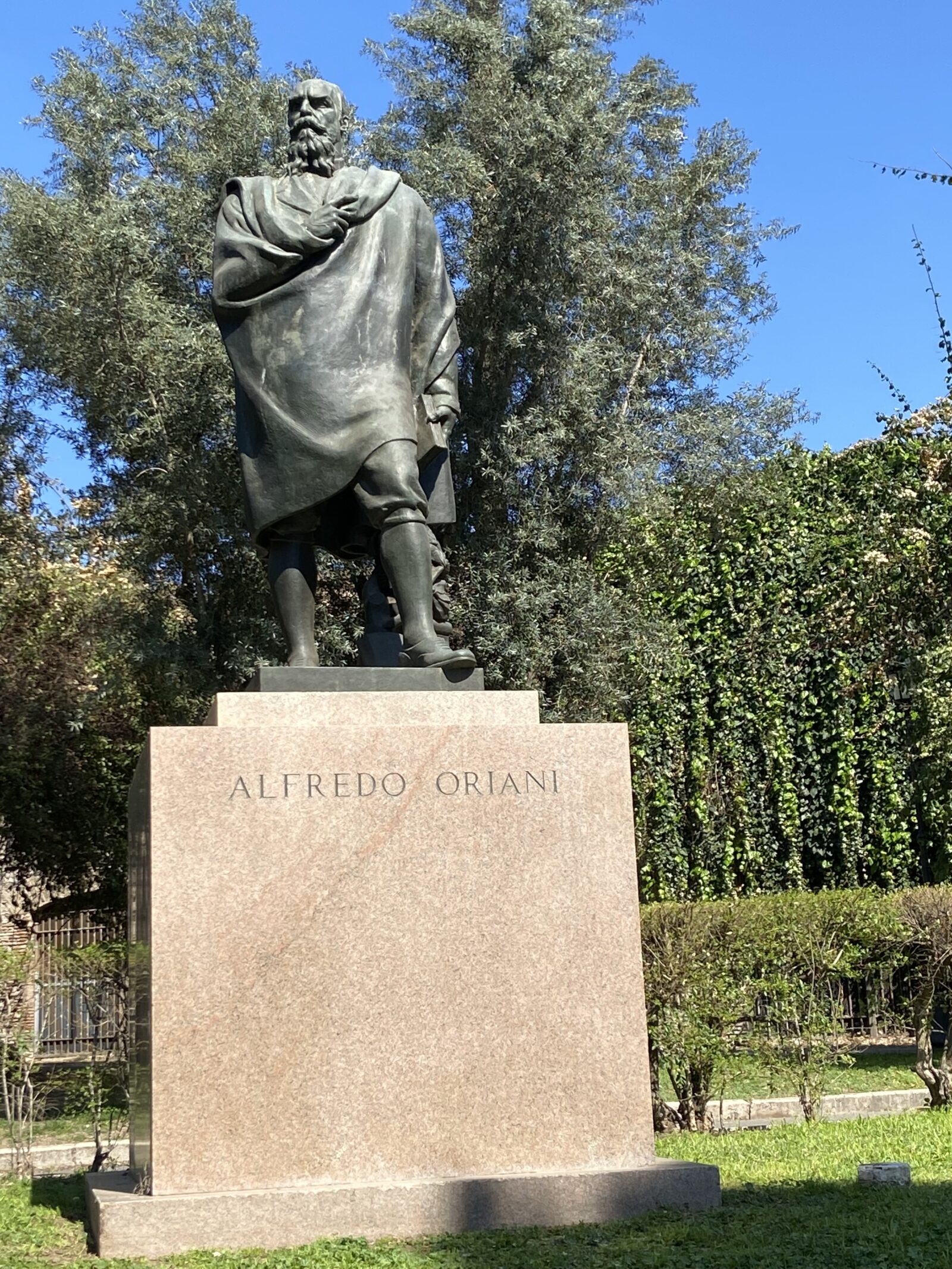
Domus Aurea
At the end of the street I found myself in Domus Aurea, the massive villa Emperor Nero built after the fire that destroyed Rome in 64 A.D. The villa was razed after one of Rome’s most unpopular emperors died in 68 A.D. In 70 A.D., Emperor Vespasian completed the Colosseum and in 80 A.D. the Baths of Titus were constructed on the grounds of Nero’s leveled villa.
What remains today is a great lookout point to the Colosseum across the street. Twenty years ago, it was a grassy area where I’d get a coffee at the little kiosk and sit outside in the sun.
It’s also the place where I had one of the great quotes of my travel writing career, one that best describes what Rome really is. Tom Shaker, a long-time Rome resident, actor, tour guide and general bon vivant, told me for a book chapter on dating in Rome, “Rome is a maternal city. That’s why it embraces you. New York is a male city. Obviously you have all those glass penises sticking up in the air. Rome is all these rolling hills.”
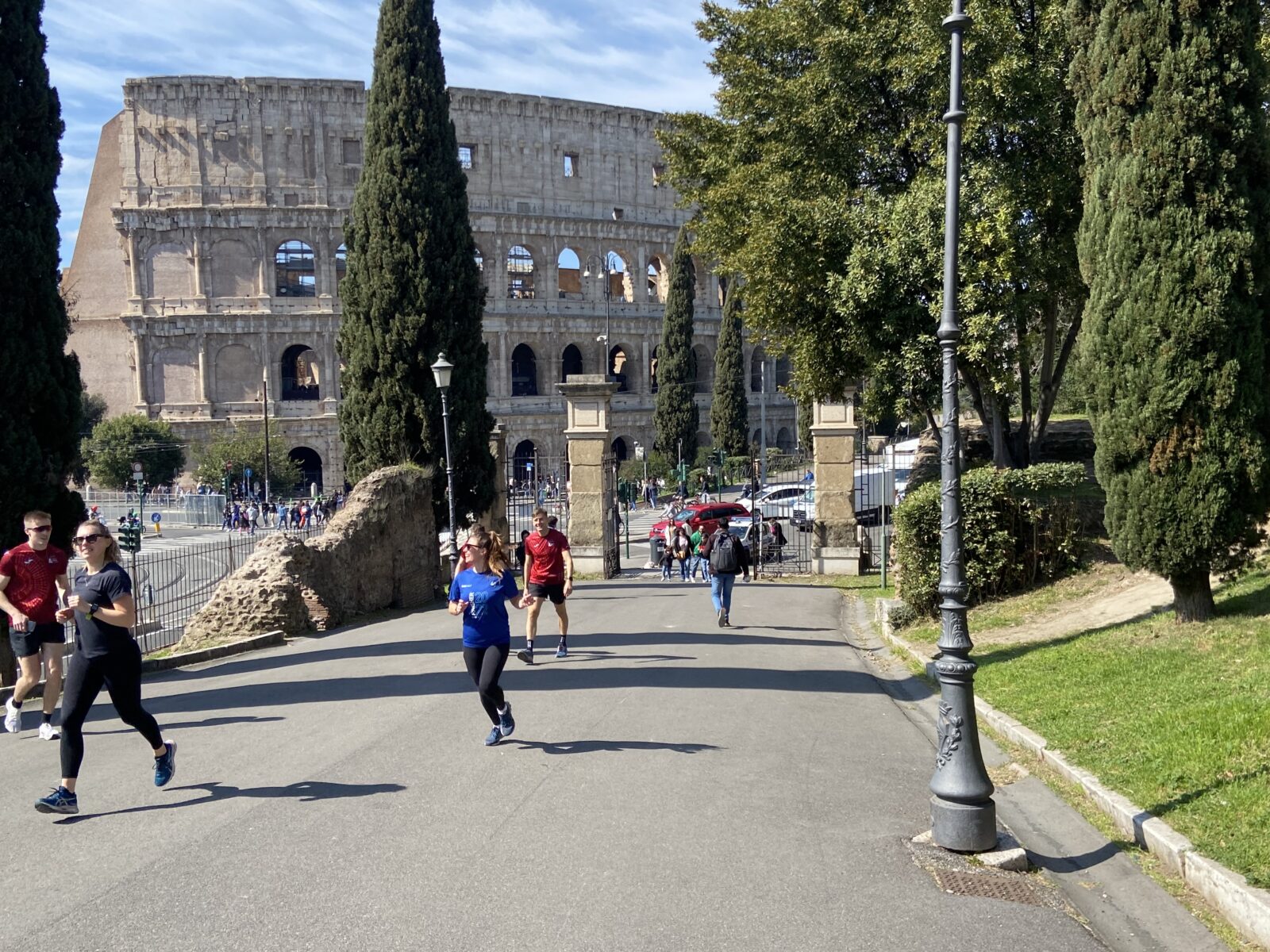
Today, the park has been renovated and features two small, rubber-surfaced basketball courts. I saw Italians with Golden State Warriors and Luca Doncic jerseys and missed the solitude of a coffee in the shadow of the Colosseum. But the view of my favorite monument across the street is the same and the Colosseum is as masculine as an executioner’s sword.
I avoided the teeming mob outside the huge walls by crossing the busy intersection and walked down Via di San Giovanni in Laterano, Rome’s one-block gay ‘hood known as Gay Street. Other than a bar called Calling Out Roma, it could pass for any street in Rome with tourists filling every outdoor table.
It’s hard to avoid tourists here, even on the quiet streets just east of the Colosseum. I stopped in Il Bocconcino for another schiumato. It advertised English breakfasts and had decor that could be an upscale cafe in New York. Nine Americans sat down for lunch. I ordered a €1.30 caffe and the friendly elderly bartender told me their clientele is 70 percent tourists.
I needed some solitude. I needed some green.
Caelian Hill
Unfortunately, I had to walk up the first large street of my trip. Via Claudia runs the length of the big wall bordering Parco del Cielo. As Air Force jets roared in tandem overhead, I made it to the entrance of Villa Celimontana. It’s on little known Caelian Hill, one of the Seven Hills of Rome.
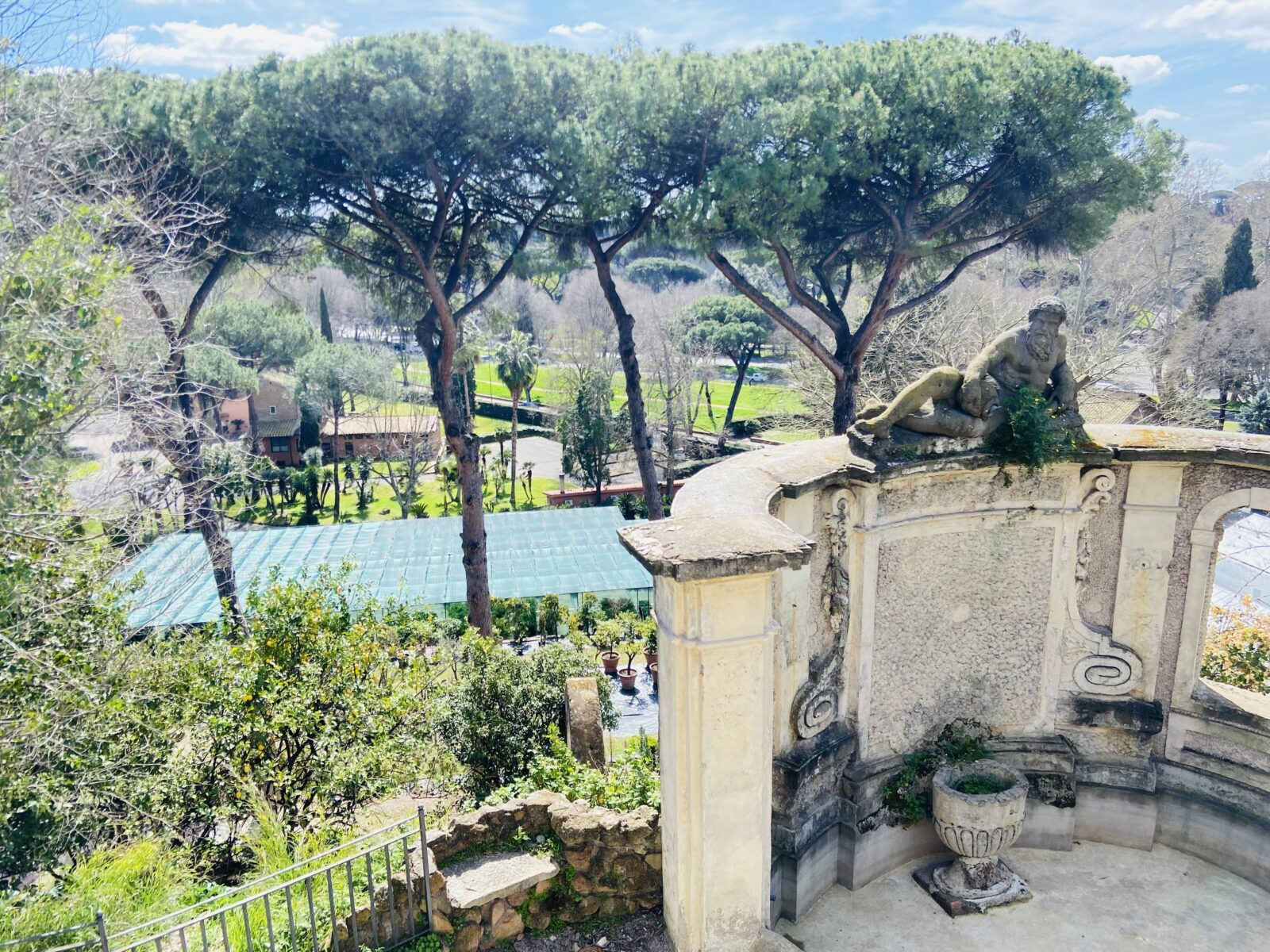
It doesn’t have the name of nearby Palatine and Aventine hills. It’s not nearly as big. The view to the city below is blocked by trees. But among the few people I encountered was a man playing the mandolin, not because he was trolling tourists for coins but because he just liked the instrument.
I cruised the gardens and took a rest next to an obelisk that once adorned the Temple of Isis in the Campidoglio, which has housed the government braintrust of Rome since the Middle Ages.
Exiting the park, I headed downhill past beautiful apartments I could never afford. At a busy intersection. I turned right down my second busy street past the Baths of Caracalla which 2,000 years ago was one of the biggest bath centers in the city.
Circus Maximus
I found a small service road that emptied out onto Circus Maximus, once the site of Rome’s chariot races. The stadium here once held 150,000 people. On the same grounds are a series of restaurants and bars that Saturday spilled over with tourists and locals eating in the sun.
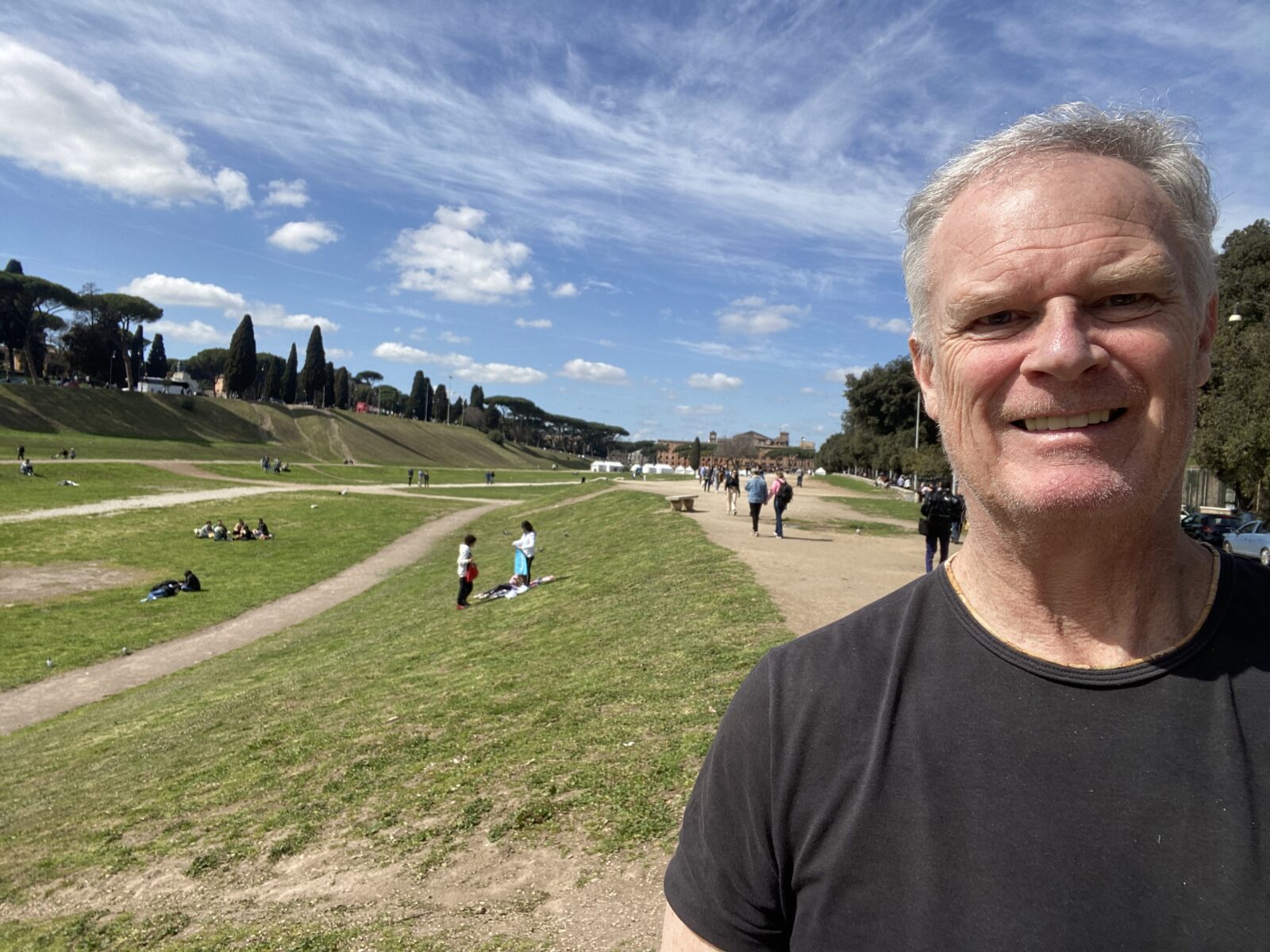
During Covid, the city built a bike path around the grounds, now used mostly for concerts, including Bruce Springsteen May 21.
For a true slice of Rome, I turned onto Via di San Teodoro to one of my favorite public markets in the city. On weekends, Circo Massimo Farmers Market is packed with local food artisans selling designer olive oil, lean meats and everything you need for a fabulous Italian meal. You can custom order a panino (Not panini, Americans.)
At the La Caciosteria cheese stand I saw Loreto Pacitti, whom I spent time with in the fall for a story I wrote for BBC.com on pecorino. Thrilled to be selling his lovely designer cheeses after two years of lockdown, he gladly drives the 95 miles (155 kilometers) from Picinisco, south of Rome, to this market every weekend.
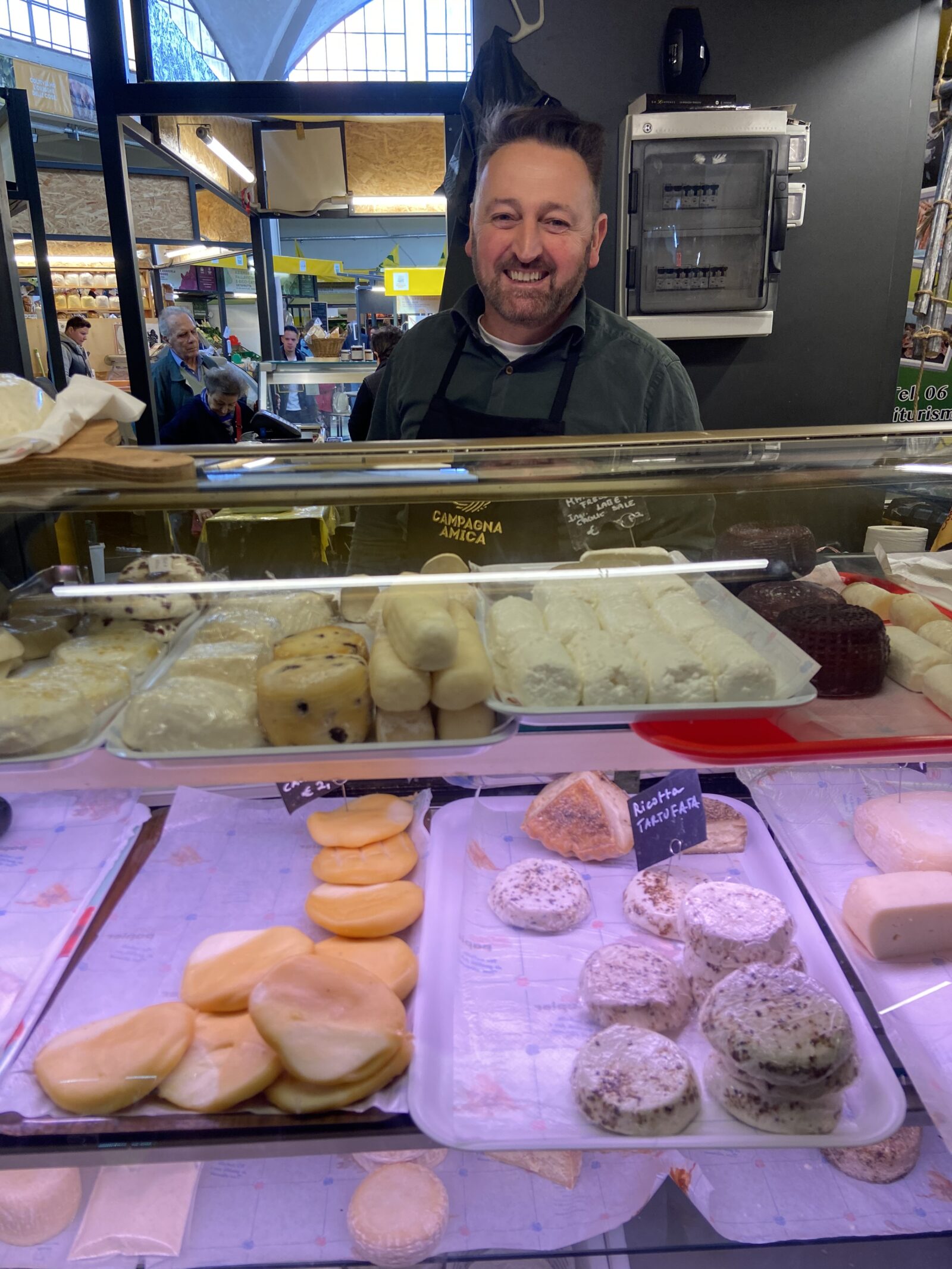
It was nearing 2 p.m. and the smells of pecorino cheese and fresh bread were attacking my stomach. My hunger led me to the Tiber River and Ponte Palatino, a relatively new Roman bridge built between 1886-90. It’s also called the English Bridge as it’s the only two-way bridge in Rome where drivers drive on the left to fit Trastevere’s odd layout.
Trastevere
Once in Trastevere, the noise stopped. I immediately found myself in its trademark warren of narrow, cobblestone roads lined with family run trattorias and cafes. The layers of Trastevere date back to before the Roman Empire. It has gone from ex-slaves quarters to site of Caligula’s mock naval battles to a Jewish neighborhood to a Bohemian neighborhood of writers, artists and communists to a base for the Banda della Magliana mafia to, now, a hip party center for hordes of tourists and overseas students.
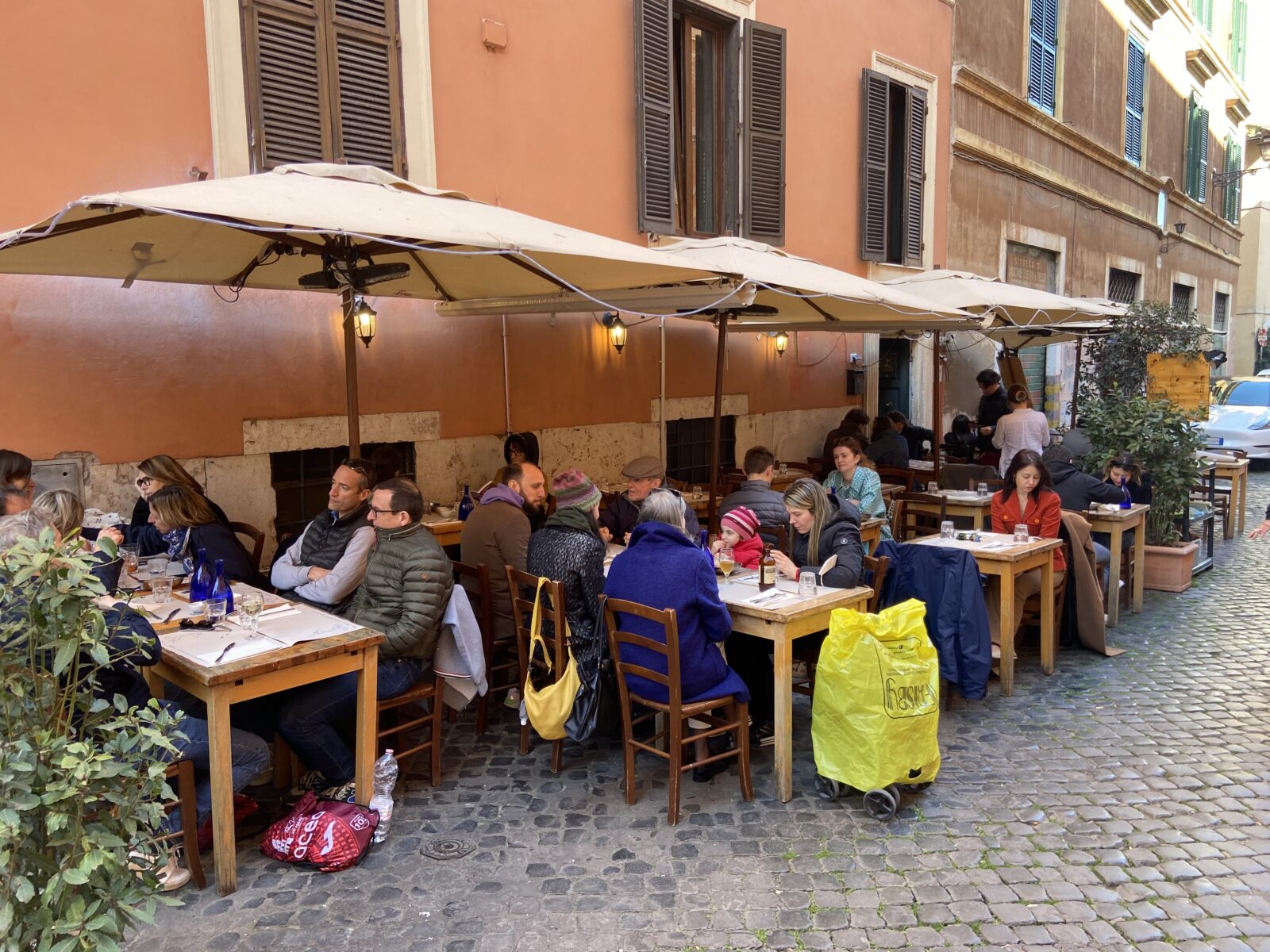
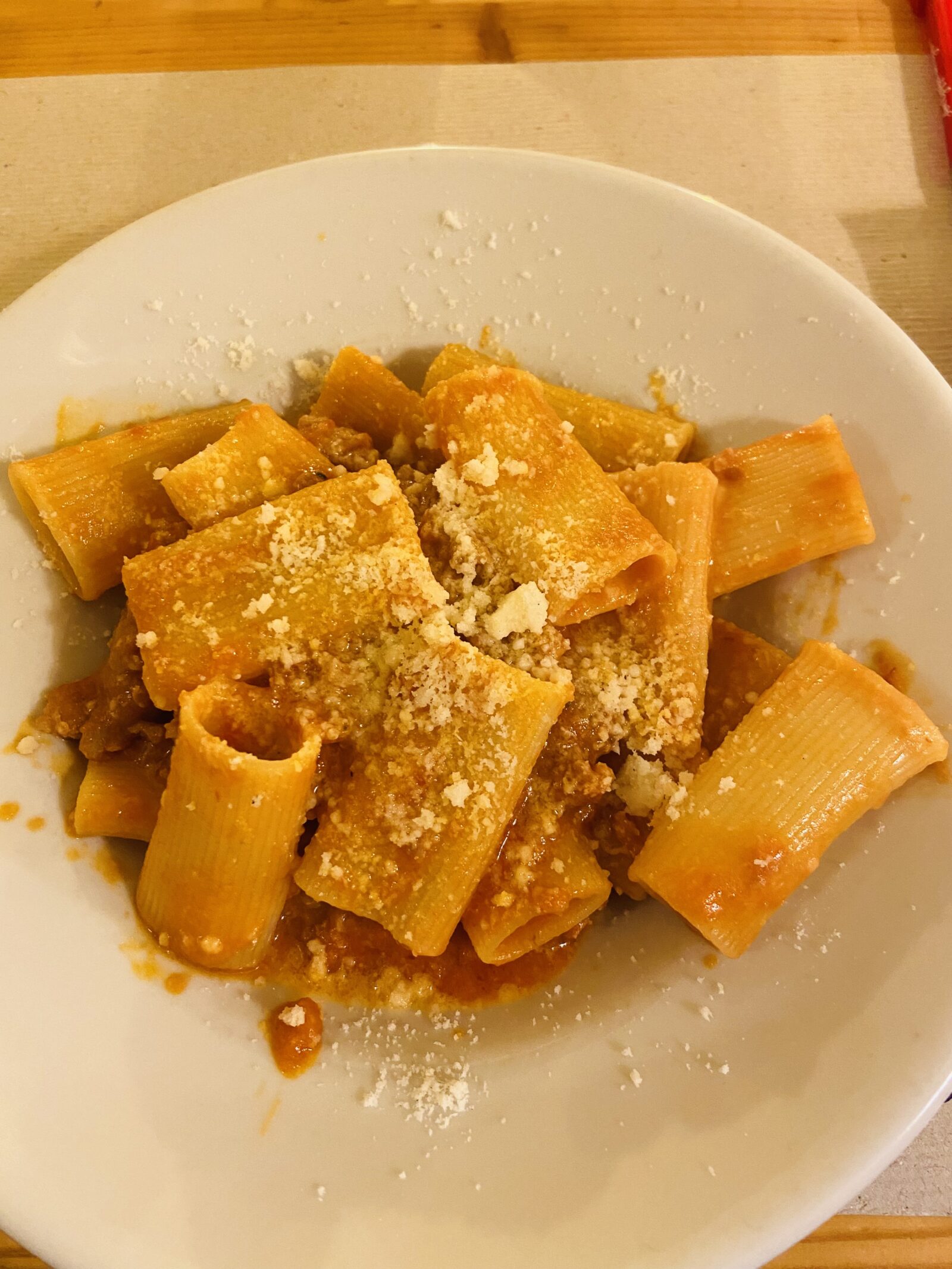
But it also has quiet side streets beyond the noise. Via dei Salumi (Salami Street) is one of them. I’d never eaten at Sette Oche in Altalena (Seven Geese in Swing) but liked the slogan slapped on the wall and waiters’ T-shirts: “Fare il cibo non la guerra. (Make food not war.)”
I ordered a house specialty, rigatoni alla burina (fat, round tube pasta with sausage) and a quarter liter of the passable house Merlot for a reasonable €22. It provided the fuel for my stretch run.
Via Sciarra
Walking to Monteverde from Trastevere is easy if you take the long, boring Via Trastevere. Taking side streets means switchbacking up and down hills but it brought me to Via Sciarra. I’d seen it on maps but never entered. It’s a charming, quiet corner of Trastevere where passing through the gate I saw white flowers blooming on trees and a pool with a running fountain. Palm trees lined the paved path.
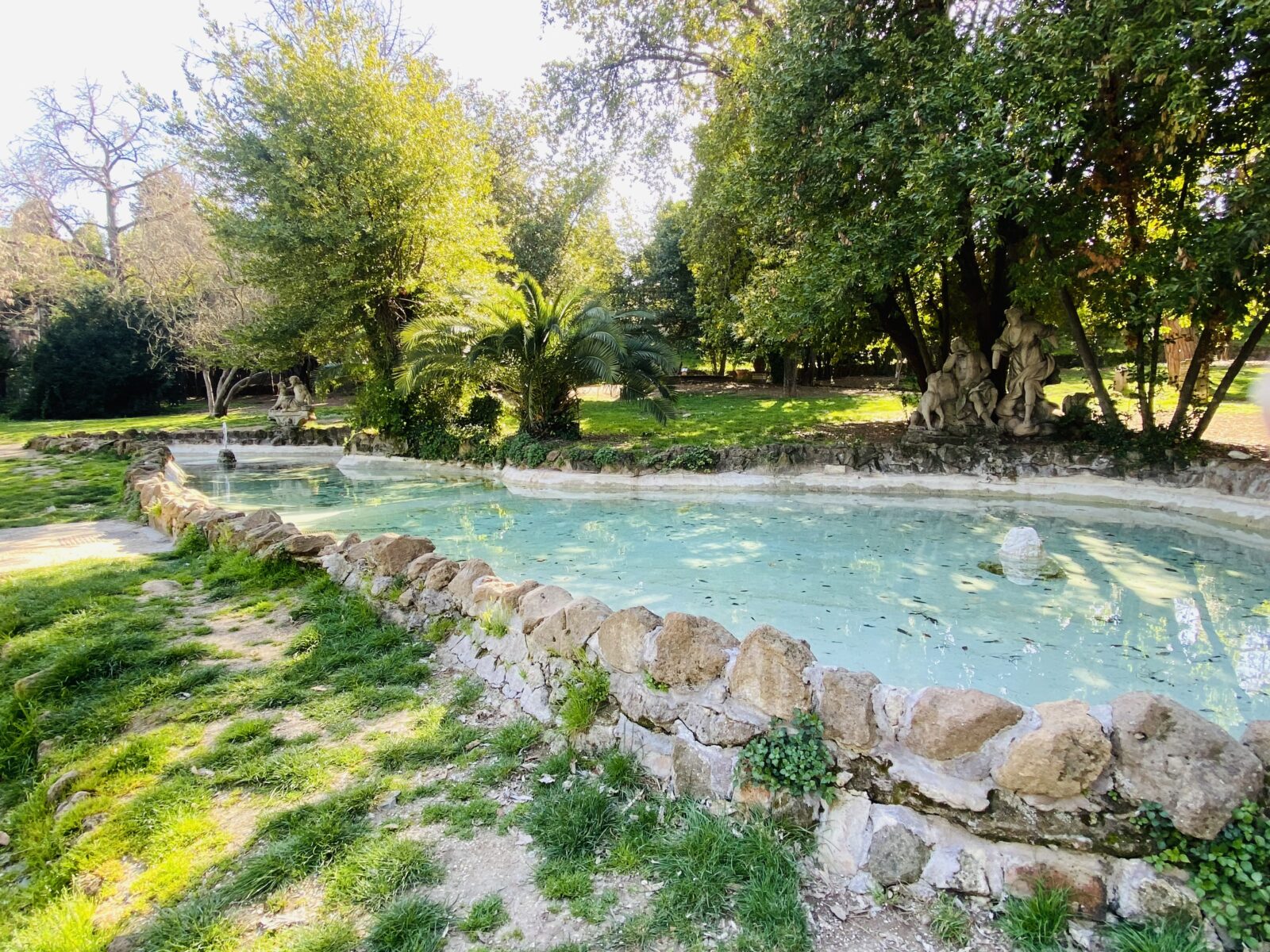
I walked past the Italiano di Studi Germanici and down a rock path to the edge of the park. Down below I saw a beautiful view of Rome. The city doesn’t have the skyline of other European cities. In fact, it has no skyline at all. But seeing the giant white confection of Il Vittoriano monument and the Colosseum beyond, Rome never fails to remind me why I moved here.
After circumventing the park, I continued climbing past the American University of Rome and Home Baked, a student hangout and my favorite place for an American breakfast. Unfortunately, the only way home was down busy Viale dei Quattro Venti, which I take nearly every day to my train station.
It was 3:30 p.m. when I arrived home. I plopped down at Romagnani Caffe, my corner bar, and treated myself to a glass of Merlot-Cabernet mix. I pointed my face to the sun. It was eight miles in 5 ½ hours. I passed through two millennia of history. I walked the same paths of Julius Caesar and Nero and Mussolini.
It’s true. All roads do lead to Rome. But in Rome, they also lead home.
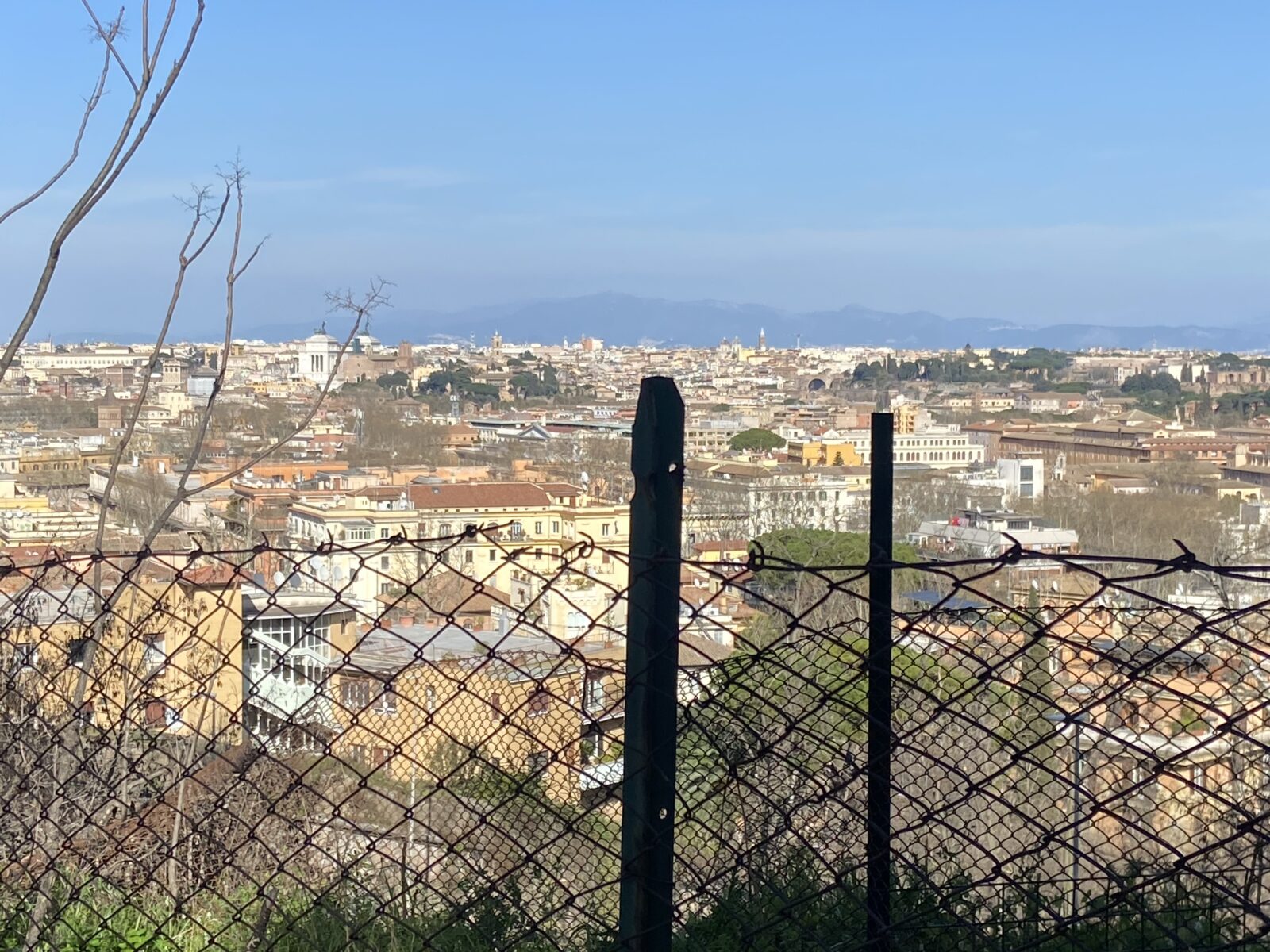


March 21, 2023 @ 12:12 pm
What a wonderful description of Rome. I was there is late October last year and it was as busy as I have ever seen it. I know my way around well enough that I was able to go where I wanted to without being in crowds. I know some lovely streets tourist don’t find.
I felt sorry for people who might only go to Italy once and encounter hordes of people everywhere. It was almost impossible to get close to the Pantheon (my favourite place in Rome) and the usual popular places.
I think this year is going to be a nightmare.
March 21, 2023 @ 2:17 pm
Thank you, John for this perfect day in Rome. This reminds me why I love Rome so much. We don’t live there but we visit often and when we do, this is what we do… walk and walk and walk. It is my favorite city in the world.
March 21, 2023 @ 2:40 pm
Absolutely love this. I aspire to take that walk with you someday.
March 21, 2023 @ 3:51 pm
Prova
March 22, 2023 @ 8:52 am
Thanks, Debra. In the summer in Rome I just sit on my balcony and eat fruit.
March 22, 2023 @ 8:53 am
Thanks, Cristina. Rome is the most beautiful city in the world. Just look down.
March 22, 2023 @ 8:53 am
Neal, if we did a passeggiata, I’ll find a route with the most enotecas along the way.
March 22, 2023 @ 5:59 pm
Enjoyed this. Some places I haven’t seen. I’ll be in Rome soon. Still my favorite. Thanks for the tour
March 24, 2023 @ 10:16 am
I didn’t pass as many little shops as my walk four years ago but the nature was wonderful.
March 22, 2023 @ 10:52 pm
thank you for sharing, I will it on my June trip, if not it will be on my next trip to Italy..
March 24, 2023 @ 10:16 am
Thanks, Fernando. You can also plot your own route. Just get a good map.
March 23, 2023 @ 4:07 pm
John
Enjoyed reading your adventures a Roma
It’s my favorite City in the world, with Bologna close behind
I live in Palm Beach Florida and for the past 10 years travel every 3-4 months with my wife ( kids occasionally) to Italy and spend most of our time in Trastevere
Recently we looked at some nice homes in Frascati and plan to buy something soon
I have a lot of family & friends in that area and love the small town vibe but just a quick ride into Termini so best of both worlds
Sadly America is not so great anymore and I think Italy will be our new home
Grazie mille e salute
March 24, 2023 @ 10:15 am
Great idea, Jeff. If you’re buying a place here, be patient and careful. It takes forever and you’ll need a local agent you can trust and who can speak English — unless you’re fluent in Italian. Those are rare. Hell, I don’t understand the real estate regulations here in English. Also, keep in mind that you should buy a place to live. Don’t look at it as an investment. Homes here are really difficult to resell.
March 23, 2023 @ 7:46 pm
On long walks, some of us follow our noses. You seem to have followed your taste buds.
Thanks for the stories!
March 24, 2023 @ 10:12 am
Thanks, Jay. It’s very easy here. And after more than nine years, I am not even close to being tired of pasta.
March 23, 2023 @ 10:48 pm
Lovely! We’re going at the end of April, wish us luck!
March 24, 2023 @ 10:12 am
Great! If you need any questions answered, feel free to drop me a line.
March 24, 2023 @ 6:16 am
thx! hope it’s not raining next month
March 25, 2023 @ 3:49 pm
Rome must be walked. And I agree, the beauty of Rome does not lie in the Vatican, Trevi, Coloseum, Pantheon, Spanish steps or whatever. It is what we experience when we walk Rome that makes us go back again and again.
March 25, 2023 @ 5:59 pm
Absolutely. It’s almost best not to have a plan or a destination. Just wander.
John Henderson
March 26, 2023 @ 5:10 pm
Love these Walks! Wish you would do a new one each Spring & Fall, or at least annually. They bring back good memories of wandering parts of my favorite vacation city!
April 4, 2023 @ 1:42 pm
I plan on it, Mike. Will try to do one from Via Flaminia south next time.
John Henderson
May 27, 2023 @ 5:03 am
Great story John! The wife and I were in Rome on Thanksgiving Day and stayed for 3 nights. I told her and everyone else that just walking around the narrow old streets was my favorite part. I had spent a week in Rome 40 years prior as a young Marine. My sister and niece were telling me about a school trip next year to Rome and I couldn’t stop thinking about how much I want to be there; I told the wife and my parents “I want to be in Rome”, I’ll be back. As you alluded to in an earlier article; it may be unorganized, maddening, chaotic even dirty……… there is something about her.
May 31, 2023 @ 7:10 am
Thanks, Dennis. The best part about living here, is you can visit the best part and do the best things at the best times.
John Henderson